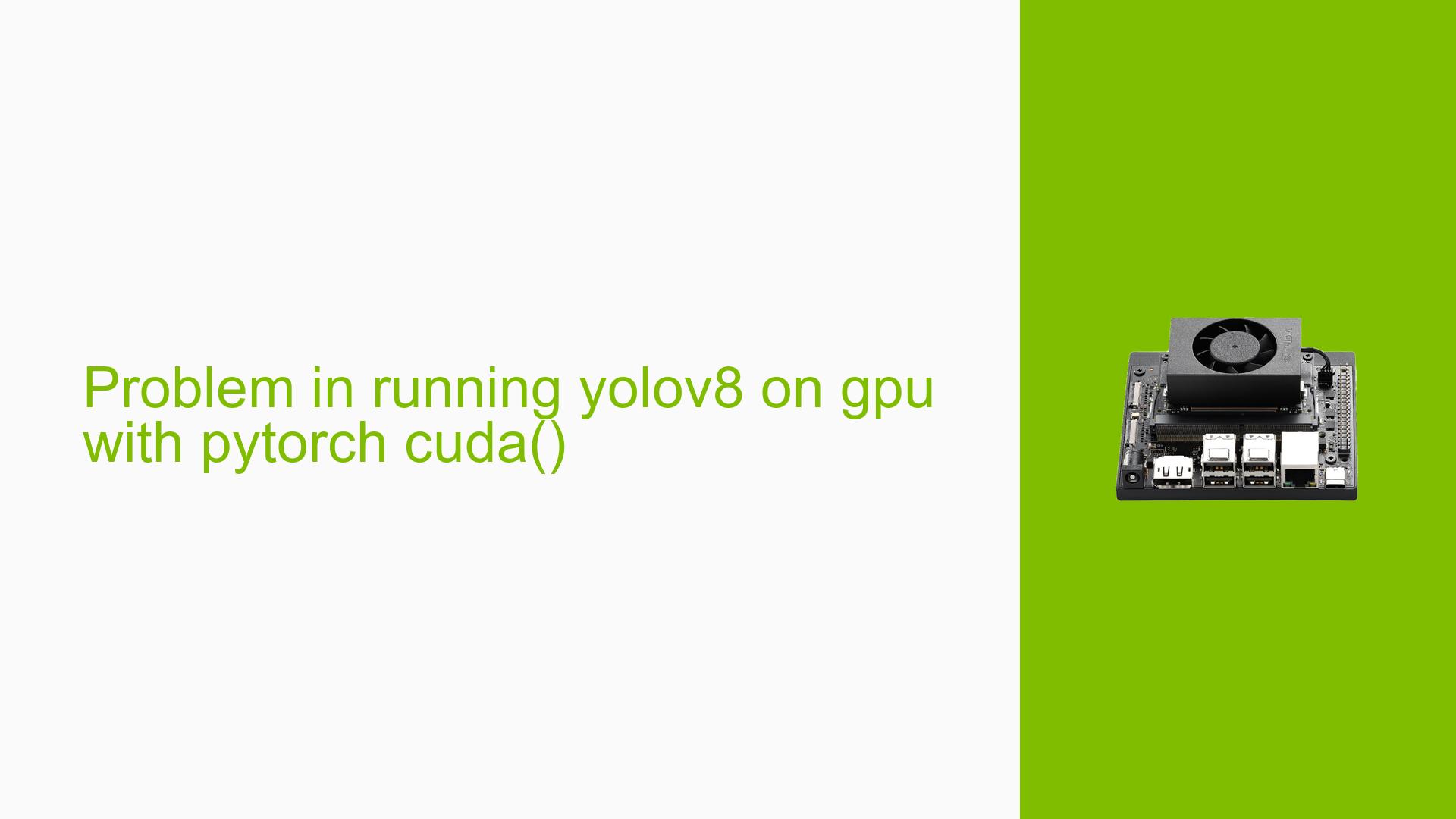Problem in running yolov8 on gpu with pytorch cuda()
Issue Overview
Users are experiencing difficulties in utilizing GPU capabilities with PyTorch on the Nvidia Jetson Orin Nano. Specifically, the command print(torch.cuda.is_available()) consistently returns False, indicating that CUDA is not enabled for PyTorch. This issue arises during the setup and execution of deep learning models, particularly when using the YOLOv8 framework. The users have CUDA version 11.4 and PyTorch version 2.0.1 installed, but compatibility issues with other libraries, such as TorchVision, have also been reported. The problem appears to be common among users attempting to leverage GPU acceleration for deep learning tasks on this platform.
Possible Causes
-
Hardware Incompatibilities: The Jetson Orin Nano may have specific hardware requirements that are not met by the installed software versions.
-
Software Bugs or Conflicts: There may be bugs in the installed versions of PyTorch or CUDA that prevent proper functionality.
-
Configuration Errors: Incorrect installation procedures or environment configurations might lead to CUDA not being recognized.
-
Driver Issues: Outdated or incompatible drivers for CUDA could result in the inability to access GPU resources.
-
Environmental Factors: Issues such as insufficient power supply or overheating could affect performance.
-
User Errors or Misconfigurations: Users may inadvertently install incompatible versions of libraries or fail to set up their environments correctly.
Troubleshooting Steps, Solutions & Fixes
-
Verify Installation of Dependencies:
- Ensure that JetPack is correctly installed on the device.
- Check if all necessary system packages are installed:
sudo apt-get -y update sudo apt-get install -y python3-pip libopenblas-dev
-
Install Compatible PyTorch Version:
- Follow the instructions from NVIDIA’s documentation to install a version of PyTorch compatible with your JetPack version:
- Use the command:
export TORCH_INSTALL=https://developer.download.nvidia.com/compute/redist/jp/v511/pytorch/torch-2.0.0+nv23.05-cp38-cp38-linux_aarch64.whl python3 -m pip install --upgrade pip python3 -m pip install --no-cache $TORCH_INSTALL
- Use the command:
- Ensure that you are using a wheel file built specifically for your JetPack version.
- Follow the instructions from NVIDIA’s documentation to install a version of PyTorch compatible with your JetPack version:
-
Check for TorchVision Compatibility:
- If encountering dependency conflicts, ensure that TorchVision is compatible with your version of PyTorch:
- For PyTorch 2.0.0+nv23.5, use TorchVision version 0.14.1:
python3 -m pip install torchvision==0.14.1
- For PyTorch 2.0.0+nv23.5, use TorchVision version 0.14.1:
- If encountering dependency conflicts, ensure that TorchVision is compatible with your version of PyTorch:
-
Test CUDA Availability:
- After installation, run the following commands to verify that CUDA is available:
import torch print(torch.cuda.is_available())
- After installation, run the following commands to verify that CUDA is available:
-
Reinstall PyTorch if Necessary:
- If issues persist, consider uninstalling PyTorch and reinstalling it using the correct wheel:
python3 -m pip uninstall torch torchvision torchaudio
- If issues persist, consider uninstalling PyTorch and reinstalling it using the correct wheel:
-
Use Prebuilt Containers:
- If installation issues continue, consider using NVIDIA’s L4T-PyTorch container which comes preconfigured with CUDA support.
-
Check Environment Variables:
- Ensure that environment variables are correctly set for CUDA:
export LD_LIBRARY_PATH=/usr/local/cuda/lib64:$LD_LIBRARY_PATH
- Ensure that environment variables are correctly set for CUDA:
-
Consult Documentation and Community Resources:
- Refer to NVIDIA’s official documentation for detailed installation instructions and troubleshooting tips here.
-
Best Practices for Future Installations:
- Always check compatibility between installed versions of CUDA, PyTorch, and other libraries.
- Maintain updated documentation and community forums for troubleshooting common issues.
By following these steps, users should be able to diagnose and resolve issues related to GPU support in PyTorch on the Nvidia Jetson Orin Nano platform effectively.
